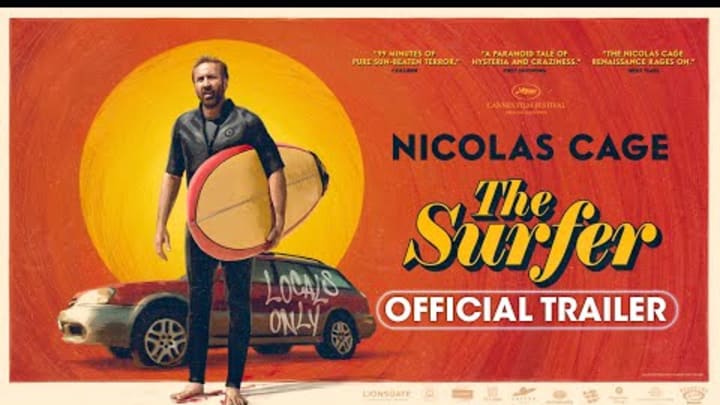Lorcan Finnegan’s The Surfer has a relatively simple premise: an unnamed surfer (played by Nicolas Cage) returns to his hometown with the intention of buying a house near the beach so he can live there with his family and surf with his son (Finn Little). As they are visiting the town before the sale of the house is finalized, the surfer goes to the beach with his son, hoping they can ride some waves. However, they are quickly ostracized by the community, with the beach’s “leader” of sorts, Scally (Julian McMahon), telling them they cannot surf here, because this area is reserved for locals only.
Even if the surfer lived here when he was a child, the fact that he doesn’t (yet) own a house forces him to leave, making him angry after Scally and his gang steal his surfboard and pretend it is theirs. From there, the film dives deep into surrealist territory, constantly blurring the lines between reality and fiction, as the scorching heat of the Australian seascape makes the surfer lose his sense of self and sends him into a downward spiral of delusion, where everyone is against him and everything goes wrong. Director Lorcan Finnegan and screenwriter Thomas Martin present us with this simple story in the same vein as Frank Perry’s The Swimmer, where we can already notice something very wrong in the surfer’s demeanor as soon as he is introduced, but the audience only reaches a level of clarity when the protagonists is pushed past his breaking point.
Nicolas Cage Shines in The Surfer

In that regard, the two succeed in drawing an alluring presentation for a film that gets more twisted as its surfer stumbles upon one chaotic situation after the next. Nicolas Cage, likely the greatest expressive actor in history, delivers yet another hilariously unhinged performance that’s as good as some of his best-ever, such as in John Woo’s Face/Off, David Lynch’s Wild at Heart, and Neveldine/Taylor’s Ghost Rider: Spirit of Vengeance. His purposefully stilted line deliveries are impeccably timed, especially when confronting Scally’s group of local surfers to get his board back, saying incredible things such as, “Dude, that’s my board, and I want it back!” or “Get out of my personal space!”
However, the most incredible scene of the entire movie isn’t even thirty seconds long and occurs during a bloody confrontation with one of the locals, as the surfer shoves a dead rat in his mouth and yells, “EAT THE RAT!” It’s the best line of the entire movie, and Cage is entirely in sync with Finnegan’s delirious sense of comedic timing. Unfortunately, moments like these are sparse in a film that consistently loses itself in its gross-out humor and flimsy thematic underpinnings, never giving us the chance to grasp its message in a way equally meaningful as Perry’s New Hollywood film. Instead, it fills the middle section of The Surfer with as many empty provocations as possible to get a visceral reaction out of the audience.
Sure, having Cage drink cigarette water is bound to instill disgust in our eyes, but it eventually loses all impact when it puts the actor in one gross-out situation after the next. He gets bit by a rat, steps on sharp glass with his bare feet, and does things that aren’t even appropriate to describe in such a review. Of course, we’ll feel something in the first few occasions where his character does some incredibly nasty stuff, but we’ll eventually realize that this is all Finnegan has to offer to mask the lack of thematic and character development in his screenplay. When reality and fiction jumble themselves to nearly uninteresting heights, we slowly lose attention in the deeper meaning behind a more psychedelic scene, or when Cage’s surfer continues to go on a more than a downward spiral.
How low does this character go? Low is an understatement, because just as we think his predicament can’t get any lower, he descends further into hell. There’s some enjoyment in seeing Cage act as deranged as he can, and McMahon is undoubtedly a great counterbalance to the surfer’s strongest emotions. I especially loved how the surfer fully knows he’s being played by Scally, who enjoys tricking him into losing everything he holds dear, so much so that, when eating a fully cooked burger in front of him, the surfer realizes he can’t do anything to change his predicament, despite his intentions of wanting to ride the waves. McMahon has always excelled at playing villainous characters as seen in Marvel’s Runaways, his best-ever performance, but his character in this film has far more layers to unpeel than the typical antagonist who taunts the surfer simply because he isn’t a local.
Sadly, most of the film’s interesting aspects are relegated to the wayside in favor of in-your-face humor that sometimes can bring about a chuckle or two, but often doesn’t work. Cage tries his best to salvage as much as possible from a project that exploits his talents well but doesn’t give him as much to work with as some of his best efforts. That said, “EAT THE RAT!” may very well be one of the actor’s most significant moments in his “late-stage” career, so there’s that. If there’s one memorable thing coming out of a Nicolas Cage movie, as inconsistent as it may be, he has already succeeded, and the memes will live on long after he is no longer with us.
The Surfer is currently in theaters everywhere.
